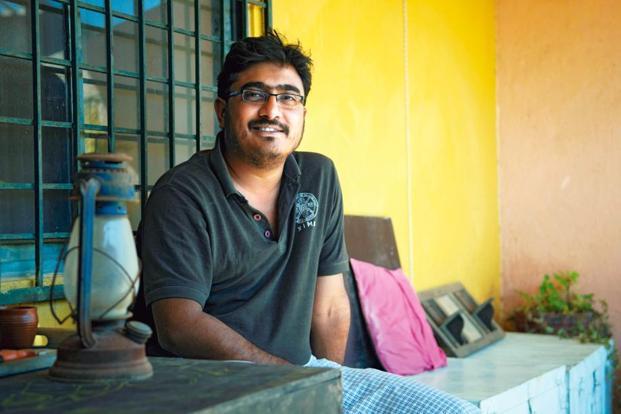Peeling Back the Layers: Live mint interview of Abhishek Majumdar on identity and the loss of home in his META-nominated play ‘Gasha’
Abhishek Majumdar | Peeling back the layers
Majumdar on identity and the loss of home in his META-nominated play ‘Gasha’
First Published: Sat, Mar 02 2013. 12 21 AM IST
When we first meet Gasha (Adhir Bhat), a Kashmiri Pandit, he is six months old. Abhishek Majumdar’s final play in his Kashmir trilogy,Gasha, follows the adventures of the titular character and his best friend Nazir (Sandeep Shikhar) through school and the streets of Kashmir till Gasha is 12, and his family is forced to leave the Valley. Gasha returns 20 years later, only to find that he can barely recognize his past. Gasha has been nominated in six categories at the eighth edition of the Mahindra Excellence in Theatre Awards (Meta), including best play. In an interview the 32-year-old director, who co-founded the Bangalore-based Indian Ensemble theatre group in 2009 along with Shikhar, talks about the themes of identity, displacement and how large political movements can impinge on the daily lives of ordinary people. Edited excerpts:
The narrative of ‘Gasha’ moves back and forth in time. How important is the process of remembering in the play?
Memory is not linear. My most distinct memories may be from seven years ago, and then from yesterday. The form is interesting. It’s the cohesion of rhythm not of time, linearity of the idea.
The critical thing is that Gasha leaves Kashmir at 12 and returns at 32. He knows nothing of what has happened here in 20 years except through newspapers, etc. You can’t possibly expect Gasha to connect to the place after this time.
There is minimalist use of props in the play—there are some suitcases that serve as chairs, altars and even as a drawing board…
Thematically, the Pandits left Kashmir with so little—if they were to tell their story, what means would they have to tell it? There’s a sense of how they left their entire home in Kashmir with just seven bags, and of living out of those bags in exile.
Also practically, we need to travel with the play. Most of our budget was spent on research. The play was made over one year.
So what kind of research did you do for this play?
The research for Gasha began with The Djinns of Eidgah (the second play in the trilogy. The first one,Rizwan, has now been made into a film). The entire team except Sandeep travelled to Kashmir; the play was initially conceived as a monologue. We lived in Kheer Bhavani (a temple), interviewed everyone in Adhir’s family and around, including former intelligence officers, people who had worked with the government and against it, Pandits and Muslims, even some hardliners who said the idea that Kashmiri Pandits were forced into exile was hogwash.
There’s an additional dimension of Bihari versus Kashmiri identity that is established early on in the play.
We wanted to develop the idea that human beings are fundamentally discriminatory. We wanted to give our characters the ability to hate as well as love. When we went there, the Kashmir rail was being extended to Baramulla. A majority of the workers were Bihari. So that added the aspect of capital, of looking at people as rich or poor.
Were the plays conceived as a Kashmir trilogy from the start?
I started by reading Agha Shahid Ali’s The Country Without a Post Office. It is Kashmiri, but it is also very universal. In fact, when I first devised Rizwan at the Film and Television Institute of India in Pune, there wasn’t a single Kashmiri in the play.
The plays can be seen as stand-alone productions. Most people will likely see only one of the three. But if the plays are seen in the order (in which they were produced), it can show a certain development.
The story of ‘Gasha’ is told for the most part from the child’s perspective…
Continued in the link – Click Here

Mahindra Excellence in Theatre Awards (META)
Celebrating excellence in theatre and stage craft, the Mahindra Group proudly presents the eighth edition of the Mahindra Excellence in Theatre Awards (META) to be held in March 2013. Recognizing and rewarding all aspects of theatre production and stage craft, META is one of the Indian theatre industry’s premier awards. META provides a concrete platform to celebrate and promote theatre’s varied elements like playwriting, set design, costume and light design, direction and performance. Instituted by the Mahindra Group, in continuation of their commitment to promoting the arts.
All the plays will be staged between 3rd to 8th March at LTG Auditorium and Kamani Auditorium, Delhi, India.
Check Schedule: http://www.metawards.com/meta-2013/schedule2013/
Buy Tickets: http://www.metawards.com/tickets
After reading this article, we bought the ticket at Rangashankara, Bangalore for Sunday evening show. The hall was half-filled. Considering that Gasha is being performed quite frequently, half-full auditorium is in fact quite a feat. I was pleasantly surprised to see Mr. Girish Karnad in the audience. The play started quite nicely. Narration moving back and forth in time, with only two performers changing their characters beautifully, without much prop. Sometimes, change of light, other times with a simple mannerism, some other times picking up a dupatta, very well crafted direction! I was quite curious how the director will build the climax and how it will end. And here the play lost me.
At around 50 minutes, the narration started getting monotonous, and finally after 1 hour and 10 min. I was not even interested how it will end. I just wanted it to end soon, Not really a fault of performers, I felt story could be made tighter so that there is some punch left when the play ends. Abhishek is considered one of the promising directors in Bangalore, today, so I expected him to hold the audience interest till the end.